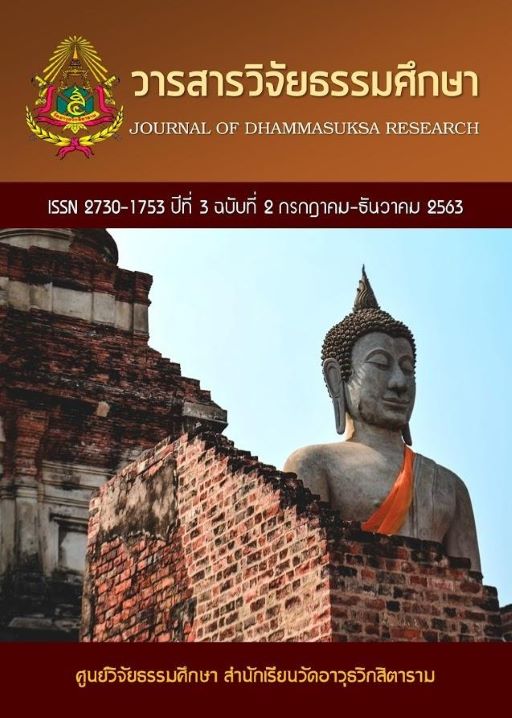การศึกษาเปรียบเทียบคำสมาสในคัมภีร์ปทรูปสิทธิและลฆุสิทธานตเกามุที
คำสำคัญ:
การศึกษาเปรียบเทียบ, คำสมาส, คัมภีร์ปทรูปสิทธิ, มภีร์ลฆุสิทธานตเกามุทีบทคัดย่อ
งานวิจัยนี้ มีจุดประสงค์ 3 ประการ คือ 1. เพื่อศึกษารูปแบบการสร้างคำสมาสด้วยกฎไวยากรณ์ในคัมภีร์ปทรูปสิทธิ 2. เพื่อศึกษารูปแบบการสร้างคำสมาสด้วยกฎไวยากรณ์ในคัมภีร์ลฆุสิทธานตเกามุที 3. เพื่อเปรียบเทียบรูปแบบการสร้างคำสมาสด้วยกฎไวยากรณ์ในคัมภีร์ปทรูปสิทธิกับคัมภีร์ลฆุสิทธานตเกามุที
ผลการวิจัย พบว่า คัมภีร์ปทรูปสิทธิแต่งโดยพระพุทธัปปิยะ ในราวปลายพุทธศตวรรษที่ 15 ถึงต้นพุทธศตวรรษที่ 16 คัมภีร์ลฆุสิทธานตเกามุทีแต่งโดยวรทราชในราวคริสต์ศตวรรษที่ 17 ในคัมภีร์ปทรูปสิทธิใช้สูตรทั้งหมด 28 สูตร ส่วนในการสร้างคำสมาสด้วยสูตรคัมภีร์ลฆุสิทธานตเกามุทีใช้สูตรทั้งหมด 79 สูตร
คัมภีร์ปทรูปสิทธิเป็นคัมภีร์ที่ได้นำเอาสูตรมาจากคัมภีร์กัจจายนะมาเรียงลำดับใหม่ แต่งอธิบายเพิ่มเติม และได้นำอุทาหรณ์มาจากคัมภีร์ต่าง ๆ ส่วนใหญ่มาจากพระไตรปิฎก ลฆุสิทธานตเกามุทีเป็นคัมภีร์ที่ได้นําสูตรจากคัมภีร์สิทธานตเกามุทีอันเป็นคัมภีร์ที่ปรับปรุงลําดับสูตรในคัมภีร์อัษฎาธยายีของปาณินิมาเรียบเรียงใหม่ตามลําดับการสําเร็จรูปของคําด้วยวิธีการที่สั้นและกะทัดรัด
คัมภีร์ปทรูปสิทธิแสดงสมาสโดยชื่อ มี 6 คือ 1. อัพยยีภาวสมาส 2. กัมมธารยสมาส 3. ทิคุสมาส 4. ตัปปุริสมาส 5. พหุพพีหิสมาส 6. ทวันทสมาส, คัมภีร์ลฆุสิทธานตเกามุทีแสดงสมาสโดยลักษณะตามตัวประธานว่ามีอยู่ 5 สมาส คือ 1. เกวลสมาส 2. อัวยยีภาวสมาส 3. ตัตปุรุษสมาส 4. พหุวรีหิสมาส 5. ทวันทวสมาส
เอกสารอ้างอิง
โควินทาจารย์. (2018). สันสกฤตวยากรณาธยยนัม. ฑีลักส อาผเสฏ พริ้นติ้ง เดลี.
ภีมเสน ศาสตรี. (2018). ลฆุสิทธานตเกามุที ไภมีวยาขยา. อชัย พริ้นติ้ง ศาหทรา เดลี.
มหฤษิปาณินิ. (2017). อัษฏาธยายี. เจาขัมพา สันสกฤต ปรติษฐาน, พาราณสี.
วรทราชาจารย์. (2018). ลฆุสิทธานตเกามุที. คีตาเปรส โครขปุร.
จำลอง สารพัดนึก. (2546). ประวัติวรรณคดีสันสกฤต 1. กรุงเทพฯ: สำนักพิมพ์มหาวิทยาลัยรามคำแหง.
พระพุทธัปปิยเถระ. (2526). ปทรูปสิทฺธิ. กรุงเทพ ฯ: เฉลิมชาญการพิมพ์.
พระมหาปฐมพงษ์ งามล้วน. (2534). ประวัติภาษาบาลีความเป็นมาและที่สัมพันธ์กับภาษาปรากฤตและสันสกฤต. มูลนิธิมหามกุฏราชวิทยาลัย ในพระบรมราชูปถัมภ์.
มหาวิทยาลัยเชียงใหม่. (2522). เอกสารประกอบการสัมมนาเรื่องอิทธิพลของภาษาบาลีและสันสกฤตที่มีต่อภาษาไทย. มหาวิทยาลัยเชียงใหม่ 24-27 ตุลาคม 2522.
M. Winternitz. (1985). History of Indian Literature. Delhi: Motilal Banarsidass.
A.A. Macdonell. (1972). A History of Sanskrit Literature. Delhi: Munshiram.
Kapiladeva Dvivedi. (1983). Laghusiddhantakaumudi. varamasi: n.p.

ดาวน์โหลด
เผยแพร่แล้ว
รูปแบบการอ้างอิง
ฉบับ
ประเภทบทความ
หมวดหมู่
สัญญาอนุญาต
ลิขสิทธิ์ (c) 2020 วารสารวิจัยธรรมศึกษา

อนุญาตภายใต้เงื่อนไข Creative Commons Attribution-NonCommercial-NoDerivatives 4.0 International License.


